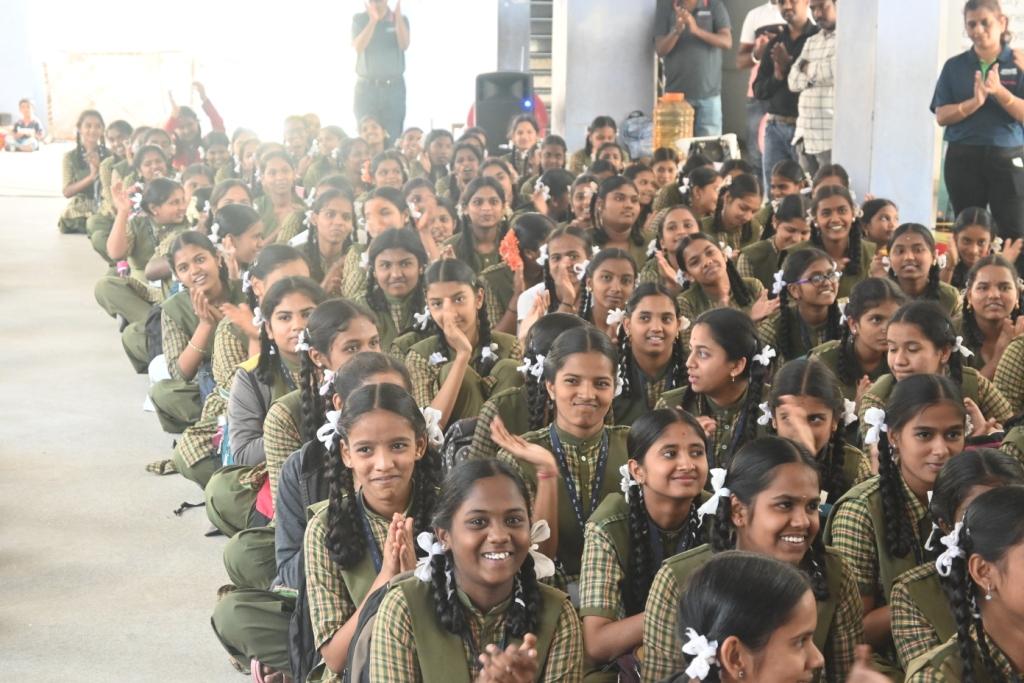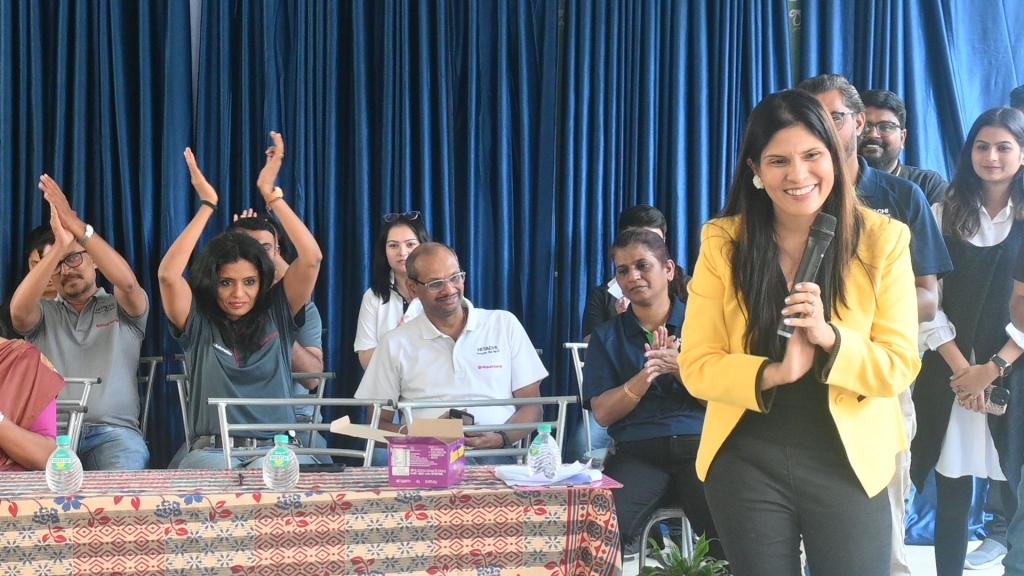Hitachi Energy India is taking a unique approach to diversity and inclusion by focusing on girls in core engineering fields. Led by Mr. Akilur Rahman, CTO and Executive Sponsor – CSR, their "Women in Engineering" (WIE) initiative tackles gender disparity at its root, empowering girls from underprivileged backgrounds to pursue careers in STEM. But how does Hitachi Energy measure the program's long-term impact and ensure inclusivity for all participants? Read on to discover the innovative strategies shaping the future of Hitachi Energy's social responsibility efforts.
Scroll down to read the full interview:
Q. Beyond awareness creation, how does Hitachi Energy measure the long-term impact of its diversity and inclusivity outreach programs on participating students and communities?
 A. Guided by the diversity and inclusion councils constituted for each business unit and function, Hitachi Energy India is working to improve diversity from the grassroots level. To increase the girl students’ participation in core engineering courses, we have launched the Women in Engineering (WIE) initiative in 2020, with an objective of sponsoring and mentoring students from economically underprivileged families. Students are selected on merit basis and initiatives are not limited to financial support but other areas like career guidance, mentorship, scholarships, industrial visits, internships and placement opportunities.Hitachi Energy gains a comprehensive understanding of the long-term impact of its diversity and inclusivity outreach programs on participating students and communities including parents and teachers of the students. This enables the organization to assess the effectiveness of its initiatives, identify areas for improvement.
A. Guided by the diversity and inclusion councils constituted for each business unit and function, Hitachi Energy India is working to improve diversity from the grassroots level. To increase the girl students’ participation in core engineering courses, we have launched the Women in Engineering (WIE) initiative in 2020, with an objective of sponsoring and mentoring students from economically underprivileged families. Students are selected on merit basis and initiatives are not limited to financial support but other areas like career guidance, mentorship, scholarships, industrial visits, internships and placement opportunities.Hitachi Energy gains a comprehensive understanding of the long-term impact of its diversity and inclusivity outreach programs on participating students and communities including parents and teachers of the students. This enables the organization to assess the effectiveness of its initiatives, identify areas for improvement.
Q. While the current program focuses on three cities, what strategies are in place to scale up these initiatives and reach a wider student population across India, particularly in rural areas?
A. We focus on rural areas, small towns (tier 1 and tier 2 towns). At present Women in Engineering (WIE) program is spread over six states. Last year December 2023 we have introduced another program for girl students who are in 11th standard and are pursuing science courses. It covers the girl student education, career, starting from PUup to the completion of Undergraduate courses in Science, Technology, Engineering and Mathematics (STEM). The program includes yearly scholarship, and training on career planning. The selection criteria remain similar to WIE -girl students from tier 1 & 2 towns and rural areas from economically underprivileged families. Currently the program is spread across nine states.Our core focus remains on empowering girl students in core Engineering and STEMby giving them access to education, skill development, and socioeconomic advancement, regardless of the geographical diversity.
Q. How does Hitachi Energy consider the intersection of gender with other social identities (e.g., caste, class) in its outreach programs, ensuring inclusivity for marginalized groups within the targeted student population?
A. In our outreach programs, we undertake efforts to identify and acknowledge the intricate interplay between gender and other social identities. Our primary focus has been on extending support to beneficiaries from economically underprivileged families, particularly targeting the girl student population. Recognizing the significant barriers to education and opportunities faced by individuals from economically disadvantaged backgrounds, we have structured our initiatives to address their specific needs and challenges.By providing access to educational resources, scholarships, and skill development programs, we endeavor to empower these students to overcome socio-economic barriers and achieve their academic and career aspirations.
Q. Beyond one-off sessions, how does the organisation ensure sustained engagement with students and communities to support their long-term development and career aspirations?
A. The girl students selected for the WIE program is regularly mentored as part of our career planning mentorship through continuous engagement. It includes a variety of training modules covering soft skills, life skills, technical abilities and employability skill development for the girl students conducted by our NGO partner and employee subject matter experts. Aligned with their academic pursuits, these programs are spread over a four-year timeframe. By extending these initiatives over a four-year duration parallel to their academic journey, we ensure sustained support and continuity in skill development.We have set up labs in institutions like Smart Electric Grid lab in NIT - Warangal and Smart & Sustainable Campus Monitoring & Analytics Center in IIT - Roorkee which provide platform for continuous learning and development of students.The training programs serve as a platform for regular interaction, fostering a supportive environment for students to engage with peers and mentors. These gatherings provide opportunities for knowledge dissemination, skill-building, and mutual support, thereby nurturing a conducive learning community.
Q. How does the establishment incentivize and empower its employees to actively participate in CSR initiatives, fostering a culture of volunteerism and social responsibility within the company?
A. The Hitachi Energy India Managing Director (MD), CEO, CTO and global CEO of the organization actively engage with all employees through regular Town Hall meetings, quarterly updates, and weekly communications, fostering a culture of motivation and encouragement. Their communication emphasizes the importance of volunteering and participating in Corporate Social Responsibility (CSR) initiatives, inspiring employees to contribute meaningfully to social causes.This will also instill a sense of purpose and shared responsibility among employees, highlighting the organization's commitment to making a positive impact on society. As a result, this proactive communication leads to active voluntary employee engagement as individuals as well as teams in diverse CSR programs across all business locations.
Q. Does Hitachi Energy collaborate with NGOs, educational institutions, or government agencies to leverage expertise and resources, maximizing the program's reach and effectiveness?
A. In order to address major educational difficulties and promote long-term effect, the organization has formed strategic alliances with non-governmental organizations (NGOs) that specialize in education. These collaborations are distinguished by a multi-year commitment, which demonstrates the organization's commitment to sustained investment in educational programs. Furthermore, partnerships with educational institutions provide opportunities for knowledge exchange, capacity-building, constitute a robust framework for driving meaningful change and advancing educational equity and excellence.We connect educational institutes with nearby schools to maximize outreach in the communities. In Warangal for example, we are developing a school near NIT as carbon-neutral model school with sustainable energy. Young school students can benefit from learning from higher education students, particularly in STEM fields. This interaction can inspire their education and support their future career development.

Q. How does the program assess the effectiveness of its "life skills" and "career development" sessions in equipping students with practical skills for future employment opportunities?
A. The organization's training programs are carefully designed to include a wide range of fundamental skill sets and hands-on learning experiences. These programs are painstakingly created to give participants a comprehensive skill set that enables them to succeed in both their personal and professional lives.Trainers and mentors conduct observations during sessions to assess student engagement, understanding, and application of concepts. Additionally, structured evaluations may be carried out to assess their demonstration of life skills and career development competencies in practical scenarios.In addition to setting up labs in institutions, we do organize innovation events (like INNOTHON in NIT Warangal) for students and researchers to learn to apply innovation in sustainability and energy transition ideas for campus, communities and schools which can cascade into larger students’ outreach.We sponsor the WIE students to summer schools in advance institutions like IISc where they get to know about larger career opportunities for themselves, be it industry/academic jobs or pursuing higher studies and research.
Q. Beyond career discussions, how does the program address unconscious gender biases related to STEM fields, encouraging girls to pursue careers in the energy sector?
A. The program conducts educational workshops focused on debunking stereotypes and misconceptions surrounding gender roles in STEM fields. Through interactive sessions, participants learn about the contributions of women in the energy sector and the importance of gender diversity in driving innovation and progress. Trainers from the energy sector provide guidance and inspiration to the students through their personal experiences, challenges overcome, and achievements in STEM careers, serving as relatable examples and demonstrating that success in these fields is attainable regardless of gender.Theorganisation has developed program to include girl students from rural areas and tier 1 & 2 towns pursuing their studies in11th standard science courses. Eventually, this aims to guide these students towards pursuing STEM courses. The program spans a duration of six years, starting from the 11th standard and continuing through the completion of their undergraduate courses.WIE students are invited to our factories and Energy Technology Experience center to have a view and feel of jobs in energy sector.
Q. How does Hitachi Energy ensure its outreach programs are accessible to students with disabilities, promoting an inclusive learning environment for all participants?
A. The organization has established equal opportunities for girl students by collaborating with their academic institutions and universities. Inputs and feedback from teachers and parents are taken for developing inclusive learning environment. With a primary focus on beneficiaries from rural areas and tier 1&2 towns from economically underprivileged families, the program also extends support to students with disabilities.By prioritizing accessibility and inclusivity in its outreach programs, Hitachi Energy demonstrates its commitment to providing equitable opportunities for all participants, regardless of their abilities. Through proactive measures and continuous improvement efforts, the organization strives to create a welcoming and supportive learning environment where every individual can fully participate and thrive.





 A. Guided by the diversity and inclusion councils constituted for each business unit and function, Hitachi Energy India is working to improve diversity from the grassroots level. To increase the girl students’ participation in core engineering courses, we have launched the Women in Engineering (WIE) initiative in 2020, with an objective of sponsoring and mentoring students from economically underprivileged families. Students are selected on merit basis and initiatives are not limited to financial support but other areas like career guidance, mentorship, scholarships, industrial visits, internships and placement opportunities.Hitachi Energy gains a comprehensive understanding of the long-term impact of its diversity and inclusivity outreach programs on participating students and communities including parents and teachers of the students. This enables the organization to assess the effectiveness of its initiatives, identify areas for improvement.
A. Guided by the diversity and inclusion councils constituted for each business unit and function, Hitachi Energy India is working to improve diversity from the grassroots level. To increase the girl students’ participation in core engineering courses, we have launched the Women in Engineering (WIE) initiative in 2020, with an objective of sponsoring and mentoring students from economically underprivileged families. Students are selected on merit basis and initiatives are not limited to financial support but other areas like career guidance, mentorship, scholarships, industrial visits, internships and placement opportunities.Hitachi Energy gains a comprehensive understanding of the long-term impact of its diversity and inclusivity outreach programs on participating students and communities including parents and teachers of the students. This enables the organization to assess the effectiveness of its initiatives, identify areas for improvement.













.jpg)



